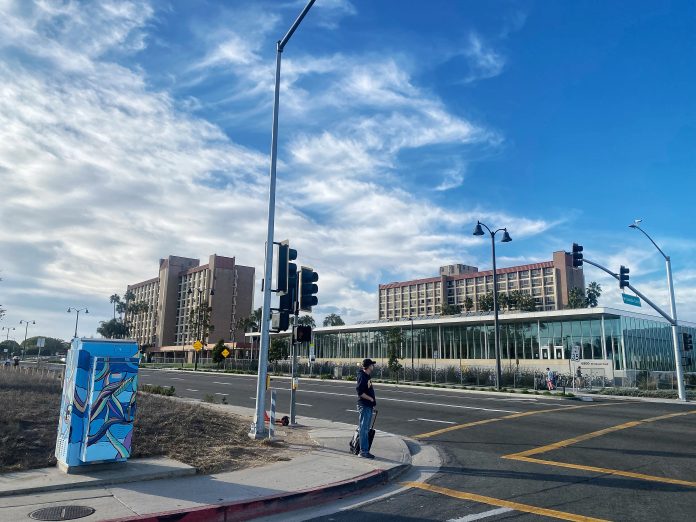Troy Sambajon & Alexis Crisostomo
National Beat Reporter & Co-News Editor
With numerous “We’re Hiring!” flyers and surrounding poster stands, UC Santa Barbara’s (UCSB) campus witnessed numerous changes to the dining commons. From Ortega exclusively serving take-out meals to Carillo switching to disposable dishware and utensils midway through the fall quarter, students continue to see how staff shortages have affected their dining experience.
Students assumed many of these changes were a result of COVID-19 precautions. However, staff shortages were an issue even before the pandemic and have only been further exacerbated since — both on a university and national level. The question is, how else will students see this issue in their daily lives? And, how can the university fix it?
The Bottom Line (TBL) sat down with current and ex-dining commons staff members to further investigate this issue, worker satisfaction, and how it might continue impact students who rely on dining common accessibility.
Many students working in the dining commons said they feel overworked after their shifts. Multiple sources have disclosed to TBL that it’s not uncommon for people to simply not show up to work. When this happens, those who do show up would have to do double the labor to compensate for their short-handed crew.
Josh Dalisay worked in the Ortega dining commons during his first and second-year pre-pandemic until the lockdown in March 2020. Dalisay remarked how, even back then, the dining commons often faced issues of workers coming either late to their shifts or not showing up at all.
“If one of them doesn’t show up, you have to do double the work. So you basically have to carry the other person. I had a couple [of] people actually quit the job because it happened to them a lot.”
While the COVID-19 pandemic has exaggerated these staffing shortages, these concerns around student-worker burnout and feelings of under-compensation all predate the pandemic.
However, this issue is not limited to UCSB. Schools such as Michigan State University (MSU) have experienced staffing shortages and the need to close down some of their dining facilities.
In an article with Inside Higher Ed, a professor at MSU commented how the pandemic only further exhausted faculty members who were invited to fill this gap. The article describes the issues of having two new classes of students who are tentative to work: freshmen and sophomores who were online their first year. MSU and other universities’ experiences have led to a multitude of questions and experiments regarding increasing pay, bringing in food trucks and chain food stores, and students petitioning for lower dining plan costs.
At UCSB, students face an even greater challenge working in the dining commons due to the uptick in positive COVID-19 cases. For now, UCSB dining commons workers will continue to tackle these struggles head-on that the COVID-19 pandemic has only further exacerbated.
Recurring feelings of dissatisfaction, feeling overworked, or underpaid are all too common.
“When you come in, you come in knowing that people, you know, complain that they’re underpaid. They’re overworked,” said a Portola supervisor anonymously to TBL.
Yet student workers accept these struggles, not as impossible conditions, but as learning opportunities. The ability to work in these conditions strengthened their capabilities with hard work ethic and organizational skills, and a mild dose of reality.
“I recommend working in the dining commons. Just don’t put too many expectations on it. I’ve learned a lot […] but go into it putting a warning in the back of your head. It’s work,” said an anonymous Portola worker.
As we continue to navigate a COVID-conscious world, pre-existing issues such as dining staff dissatisfaction may continue to worsen. Until then, TBL will continue to cover how students may continue to see fluctuations in food options, dishware use, food pick-up availability, and overall dining capabilities.











